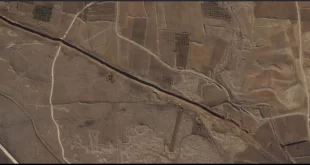Sep 6, 2013, al-Akhbar
Informed insiders have confirmed that Syria and Hezbollah plan to retaliate against Israel in the event of an American-led military attack on Syria. Says one: “if even one US missile hits Syria, we will take this battle to Israel.”
An official who spoke to me on the condition that neither his name or affiliation is published, says the decision to retaliate against Israel “has been taken at the highest levels within the Syrian state and Hezbollah.”
Why attack Israel after a US strike?
“Israel has been itching for a fight since their 2006 defeat by Hezbollah,” explains an observer close to the Lebanese resistance group. “They have led this campaign to draw the US into a confrontation with Syria because they are worried about being left alone in the region to face Iran. This has become an existential issue for them and they are now ‘leading’ from behind America’s skirts.”
The “Resistance Axis” which consists of Iran, Syria, Hezbollah and a smattering of other groups, has long viewed attacks on one of their members as an effort to target them all.
And Israeli aggression against this axis reached a new high in 2013, with missile strikes and airstrikes unseen for many years in the Levant.
Israel has reportedly conducted at least three separate, high profile missile strikes against Syria this year, effectively ending a 40-year ceasefire between the neighboring states. The last overt violation of this uneasy truce was in 2007 when the Jewish state destroyed an alleged nuclear site inside Syria.
Then two weeks ago, Israel launched its first airstrike in Lebanon since the 2006 war, bombing a Popular Front for the Liberation of Palestine–General Command (PFLP-GC) target in an entirely unprovoked attack. Earlier, four rockets had been launched into Israel from Lebanese territory, but an unrelated Al Qaeda-linked group took credit for that incident.
When asked whether Syrian allies Russia and Iran would participate in retaliatory strikes against Israel or other targets, the official indicated that both countries would back these efforts, but provided no information on whether this support would include direct military engagement.
The Russians have stated on several occasions that they will not participate in a military confrontation over Syrian strikes. Iran has not offered up any specifics, but various statements from key officials appear to confirm that strikes against Syria will result in a larger regional battle.
On Tuesday during an official visit to Lebanon, Iranian parliamentarian and Chairman of the (Majlis) Committee for National Security and Foreign Policy Alaeddin Boroujerdi told reporters: “The first party that will be most affected by an aggression on Syria is the Zionist entity.”
His comments follow a steady stream of warnings by senior Iranian officials, which have escalated in tenor as western threats to attack Syria have intensified.
“The US imagination about limited military intervention in Syria is merely an illusion, as reactions will be coming from beyond Syria’s borders,” said the Commander of the Islamic Revolution Guards Corps Major General Mohammad Ali Jafari last Saturday.
Even Iran’s Supreme Leader Ayatollah Ali Khamenei has stepped into the fray, warning the US and its allies: “starting this fire will be like a spark in a large store of gunpowder, with unclear and unspecified outcomes and consequences”.
Concurrent with these warnings, both Iran and Russia have been urging the West to avoid further confrontation and return to the negotiating table to resolve Syria’s 29-month conflict. But instead, western officials and diplomats in the Mideast have spent the past few weeks hitting up their regional sources for information on how Syria’s allies will react to a strike.
An unusual visit to Tehran by UN Under-Secretary-General for Political Affairs Jeffrey Feltman (a former senior US State Department official) was one such “feeler.”
According to several media outlets, the Iranians had a singular response to Feltman’s efforts to gauge their reaction to a US strike: if you are serious about resolving the Syrian crisis, you must first go to Damascus, and follow that by launching negotiations in Geneva.
Gunning for a fight
While Israel plays heavily in the background, by turns provoking and encouraging western military intervention in Syria, it publically denies any role in this business.
Just this week, Israeli President Shimon Peres attempted to distance the Jewish state from events in Syria by insisting: “It is not for Israel to decide on Syria, we are in a unique position, for varying reasons there is a consensus against Israeli involvement. We did not create the Syrian situation.”
He’s right about one thing. Any visible Israeli military intervention in Syria will likely raise the collective ire of Arabs throughout the region. But Peres is being disingenuous in suggesting that Israel hasn’t played a pivotal role in dragging the region to the brink of a dangerous confrontation.
In fact, since its establishment as a state, Israel has possibly never been more motivated to force a military confrontation in the Mideast:
The Arab uprisings, a shift in the global balance of power, increased isolation and the waning influence of Israel’s superpower US ally have all served to remind Israel that it stands increasingly alone in the Mideast in confronting its longtime adversaries – Iran, Hezbollah, Syria and various Palestinian resistance groups.
Before a US exit from the region becomes patently clear to one and all, Israel needs to disarm its foes – and it needs the Americans to do that. For years, the Israeli establishment has regularly threatened military strikes against Iran, in most part attempting to inextricably embroil Washington in this military venture.
Forcing ‘red line’ narratives into western political discourse – whether it be the use of chemical weapons in Syria or a civilian nuclear program in Iran – has become a clever way to commit allies to an Israeli military agenda.
When US President Barack Obama last week appeared to suddenly revise his plans to launch a strike on Syria by deferring the decision to Congress, Israel went into overdrive:
Two Israeli missiles were launched off the Syrian coast in the Mediterranean Sea to raise temperatures again. Whether this was meant to be veiled threat, a provocation, or an attempt to pin the deed on Syrians is unclear. What is certain is this: Russian early radar systems caught the activity and publicized it quickly to ward off misunderstandings that might trigger counterstrikes.
This quick reaction forced Israel – under US cover – to acknowledge it had participated in unannounced ballistic missile tests. The Iranians reacted very skeptically. Chief of Staff of the Iranian Armed Forces General Hassan Firouzabadi said the missiles were “a provocative incident” conveniently executed as western nations withdrew from plans to attack Syria, and called Israel “the region’s warmonger.” He further charged: “If the Russians had not traced the missiles and their origin, a Zionist liar would have alleged that they belonged to Syria in a bid to pave the way for breaking out a war in the region.
On an entirely different front, Israel has been amassing its considerable army of US supporters and lobbyists to ensure a compliant Congressional vote on strikes against Syria.
All its heavy hitters have now stepped up to push US lawmakers into backing military intervention, even though polls continue to show the majority of Americans rejecting strikes.
The Israeli lobbying effort has been particularly critical to ensure there is bipartisan consensus and that Obama’s Republican opponents join the bandwagon. To ensure this, the scope of the “surgical strikes” had to be expanded for GOP members opposed to a cursory punitive strike against Syrian government interests.
Key Republicans have since piled on, and already there are soundings of ‘mission creep.’ Obama told lawmakers on Tuesday that his plan “also fits into a broader strategy that can bring about over time the kind of strengthening of the opposition and the diplomatic, economic and political pressure required – so that ultimately we have a transition that can bring peace and stability, not only to Syria but to the region.”
This suddenly sounds remarkably like President George W. Bush’s plans to remake the Middle East. And it is everything Syria and its allies have both feared and suspected from the start.
Existential for you, existential for me
If ever there was a real ‘red line’ in the region, this is it. Any “limited” or “broad” military intervention in Syria is simply unacceptable to Syria, Iran, Russia, Hezbollah, China and a whole host of other nations that want to turn the page on US hegemonic aspirations in the region and beyond.
Washington has miscalculated in thinking that an attack in any shape or form would be palatable to its quite incredulous adversaries. They are all intimately familiar with the slippery slope of American interventionism and its myriad unintended consequences.
Israel, in particular, appears to be victim to a false sense of security. Analysts and commentators there seem to think that the lack of a Syrian military response to recent Israeli missile strikes is a trend likely to continue. Or that Hezbollah and Iran would have no ‘grounds’ to climb aboard a counterattack if Syria were attacked.
But the fact is that, to date, no member of the Resistance Axis has faced a collective western-Israeli-GCC effort to strike a blow at their core. This promised US-plus-allies strike against Syria makes their calculation an easy one: there is nowhere to go but headfirst into the fracas.
As Israel warplanes pounded Lebanon during the 2006 war, then-US Secretary of State Condaleeza Rice got one thing right. Refusing to call for a ceasefire, Rice explained that battle was sometimes necessary to break free of the status quo and emerge with a new regional order. The carnage, in short, was simply “the birth pangs of a New Middle East” – something to endure in order to reach a desired outcome.
But in 2006, conditions were not yet ripe for an all-out confrontation on multiple fronts. Today’s confrontation, however, has all the ingredients to fundamentally shift the region in a clear new direction, depending on which side emerges victorious.
What Rice did not anticipate seven years ago was that a few thousand Hezbollah fighters could shake the region beyond Lebanon’s small borders in a mere 33 days – simply by emerging from battle with Israel, leadership and capabilities intact.
The US has never predicted outcomes successfully in the Middle East and is unlikely to do so this time given that its strategic and military objectives seem even more muddled than usual. What we do know is that Hezbollah Secretary-General Hassan Nasrallah has promised that the “next battle” will take place inside Israel’s borders and that he will fight proportionately this time – striking Israeli cities when Israel hits Lebanese ones.
On the Syrian front, Israel imagines a war-weary adversary. But the Syrian armed forces have the kinds of conventional weapons and ballistic missiles that can level a town in short shrift – that is not an outcome Israel has the capacity to endure.
In yet another corner is Iran, boasting a rare combination of military manpower, hardware, technology and tactical skills that Israel has never faced in any adversary on the battlefield. Russia looms large too – it may provide military intelligence to its allies or it may just use its clout in the UN Security Council to intervene at opportune moments in the fight. Either way, Moscow is a huge asset for the Resistance Axis – and will be joined by China to coach and calibrate responses to the fighting from the ‘international community.’
Meanwhile, as if unable to stop a ‘war trajectory’ once it starts, the US Senate’s Foreign Relations Committee has just voted to widen and deepen the scope of a US attack on Syria. The new goal? To “reverse the momentum on the battlefield” against the Syrian army and “hasten Assad’s departure.”
This is no different than Libya, Afghanistan or Iraq. Israelis and Americans need to understand that language and behavior threatening ‘regime-change’ gives their adversaries only one choice: to retaliate with all their capabilities and assets on all fronts. Washington just made this existential. No more games, no more rhetoric. Any strike on Syria will be ‘war on.’ In US military parlance: a ‘full-spectrum operation’ will be heading your way. And you can call it Operation “Tip of the Iceberg” out of sheer accuracy, for a change.
 Syria Support Movement solidarity with the Syrian people
Syria Support Movement solidarity with the Syrian people




